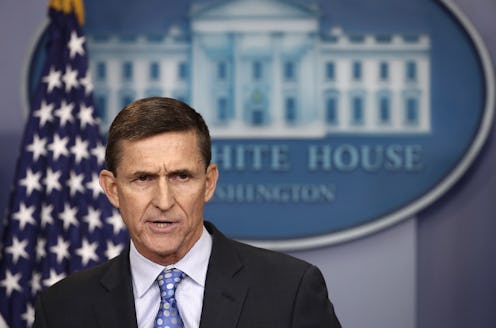News
The Comey Memo Is The Most Convincing Argument For Impeachment Yet

Last week, President Trump raised eyebrows when he abruptly fired FBI Director James Comey. Now, he's raising more. According to a widely reported memo from Comey, the president allegedly asked the FBI director to end an investigation into former National Security Adviser Michael Flynn. It sounds sketchy for sure, but just how bad of an allegation is it? As it turns out, blocking the Flynn investigation could be an impeachable offense.
First, a recap: Comey was fired last week after Trump heeded the recommendations of his attorney general and deputy attorney general. Those recommendations were based largely on Comey's handling of the investigation into the Hillary Clinton private email server. However, it's important to note that Comey was also handling an investigation into Russia's connection with the presidential election, which could potentially implicate President Trump. In other words, Comey's firing seemed fishy from the start.
A week after he was removed from office, Comey was back in the news on Tuesday for a paper trail that he reportedly left behind at the FBI. Perhaps most notably, that paper trail includes a memo that allegedly indicates Trump encouraged Comey to drop the investigation into Flynn's ties to Russia. The memo has not been released, but its existence was first reported by The New York Times and verified by other outlets.
For its part, the Trump administration has denied the allegation. In a statement, the White House said that Trump "never asked Mr. Comey or anyone else to end any investigation."
If Trump did ask Comey to drop his investigation — to "let this go," as the Times reported Tuesday — then he may be guilty of an impeachable offense. But, given the highly political impeachment process, it depends on your perspective.
According to the U.S. Constitution, a president can be impeached for "treason, bribery, or other high crimes and misdemeanors." Blocking the investigation of Flynn's relationship with Russia doesn't seem to constitute either of the first two offenses — unless you argue that Russia is an enemy of the United States and blocking the investigation somehow helped Russia, thereby lending the offense to treason. (But, again, it's probably not really an act of treason.)
It's more likely that blocking the investigation would fit into the final, ambiguous category of "other high crimes and misdemeanors." Surely, the allegations against Trump sound like obstruction of justice. In fact, in 1974, President Nixon resigned just as he was about to face impeachment for that very same charge.
Although he was ultimately not impeached before he resigned, Nixon's case set an important precedent. Nixon reportedly attempted to block the Watergate investigation, which would have revealed shady campaign tactics used by his administration. When the House of Representatives took up Nixon's case, lawmakers on the House Judiciary committee voted to approve an impeachment charge for obstruction of justice. If the president hadn't resigned when he did, he almost surely would have been charged with impeachable obstruction of justice by the House at large.
The parallels between Nixon's case and the allegations currently being levied against President Trump may be the most convincing argument for Trump's impeachment yet. The chances of removing Trump from office may still remain low, given that the impeachment process must start in the Republican-led House of Representatives. But it certainly makes sense that these allegations raise more than a few eyebrows.